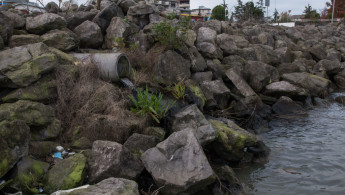Residents of Iran's Ahwaz region supplied with 'sewer water': MP
An Iranian MP has said that the people of the ethnically Arab Khuzestan region in the southwest of the country, also known as Al-Ahwaz, are being supplied with highly-polluted "sewer water".
The water issues in the cities of Abadan and Khorramshahr continue to impact the lives of citizens, with little help being offered by the Iranian government.
"In Abadan and Khorramshahr, we supply people with sewer water," Iranian MP Ahmad Laftehnejad told officials at a meeting on Sunday.
"We have no such thing as water development projects in Abadan and Khorramshahr. For the past 32 years there has been no plan to resolve water shortages in these two cities, and that needs to be investigated."
Laftehnejad said the continued failure of subsequent Iranian governments to tackle the water problems, means that people living in the region are "facing all kinds of diseases and skin reactions"
The comments by Laftehnejad are the latest developments in a long-running water shortage saga that have plagued the Khuzestan region, which is also called Al-Ahwaz by many of its Arab residents.
The region has many rivers and plains, but despite this, residents have suffered from decades of water shortages and farmers have struggled with failing crops and livestock.
"Because of the water shortages and the contamination of the water, the local people see that... trees are dying every day," Ahwazi activist Rahim Hamid told The New Arab.
"They are losing their source of agriculture and for raising their livestock.. they have no option to make a living, the water is very polluted. There is no source of living," he said, adding that many people had now moved outside the region.
In July, protests broke out against the continuing shortages and the failure of the government to implement water purification and supply projects.
Security forces responded violently, opening fire on demonstrators. At least 12 people were killed, and approximately 2,000 others were arrested.
While Laftehnejad's comments have drawn renewed attention to the situation in the Ahwazi region, the problem has been widely known for many years with local companies dumping waste in rivers and polluting water supplies.
According to Hamid, the failure of the government to deal with these issues date back as far as the Iran-Iraq war, when the infrastructure of the area suffered huge damage.
"Despite the passage of around 38 years, the government didn't allocate any funds to rebuild or to reconstruct, not improving the damaged infrastructure of these cities [Abadan and Khorramshahr]," he said.
Hamid accused the Iranian government of deliberately neglecting the region in order to alter its ethnic make-up, forcing Arab residents to move to Persian-majority cities.
"Iran wants to empty these oil and gas and petrochemical industrial cities of Arabs because they see them kind of as a national threat," he said.
Prospects for employment at the oil and gas and petrochemical companies for locals are slim, due to the discrimination faced by the Arab population, Hamid says.





 Follow the Middle East's top stories in English at The New Arab on Google News
Follow the Middle East's top stories in English at The New Arab on Google News


